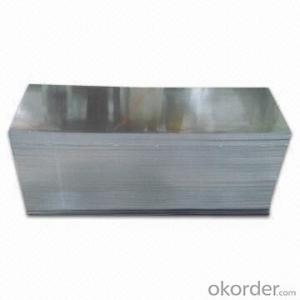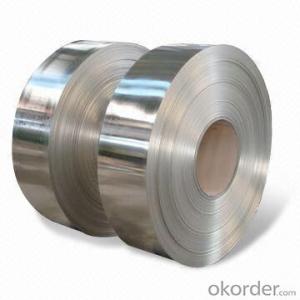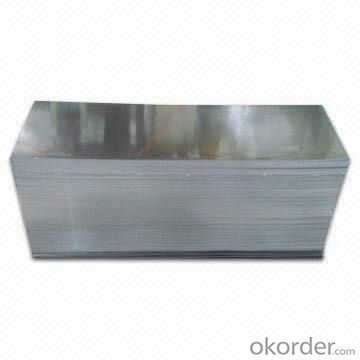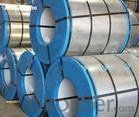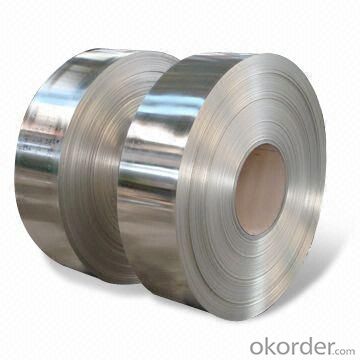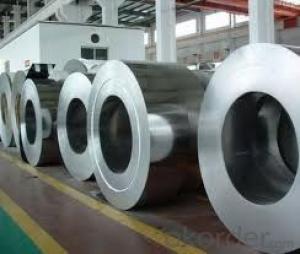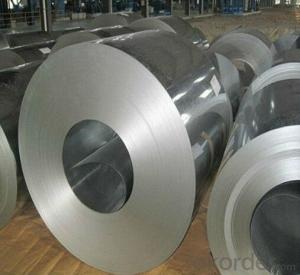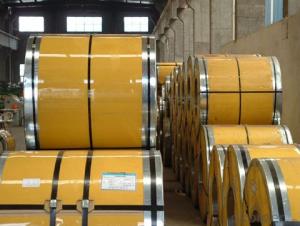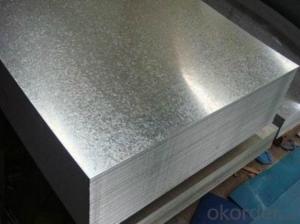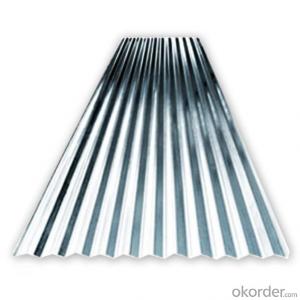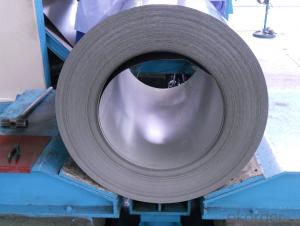Hot Dipped Galvanized Steel sSheet Regular Spangle
- Loading Port:
- Shanghai
- Payment Terms:
- TT OR LC
- Min Order Qty:
- 25 m.t.
- Supply Capability:
- 10000 m.t./month
OKorder Service Pledge
OKorder Financial Service
You Might Also Like
Quick Details
| Standard: | ASTM, GB, JIS | Grade: | SGCC. SGCH. DX51D+Z. JIS G3302 | Thickness: | 0.15mm-5.0mm |
| Place of Origin: | China (Mainland) | Brand Name: | CNBM | Type: | Steel Coil |
| Technique: | Cold Rolled | Surface Treatment: | Galvanized | Application: | Roofing sheet and PPGI Base and Building Materials |
| Special Use: | High-strength Steel Plate | Width: | 600mm-1250mm | Length: | Customized |
Packaging & Delivery
| Packaging Details: | Export Packing |
| Delivery Detail: | 30 Days |
Galvanized Steel Coil
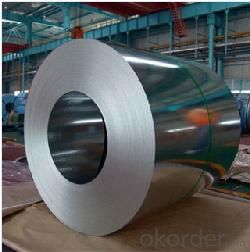
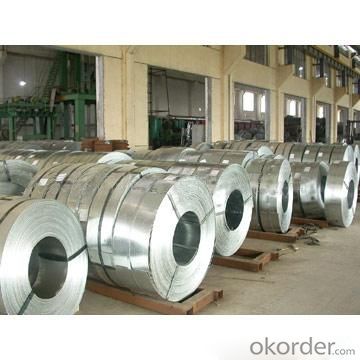
Specifications:
Thickness: 0.13mm TCT up to 5.0mm TCT.
Width: 600mm up to 1250mm.
Zinc Coating: 40-450G/M2.
Chromated, Dry, Skin-passed, Tension Level, Shining. Oiled or Unoiled.
Regular Spangle, minimum Spangle, Large Spangle, Zero Spangle.
Temper: Full Hard (85-95 HRB; G550). Commercial Quality (50-75 HRB; G350).
Coil Weight: 3-6 MT.
Coil ID: 508mm or 610mm.
Shipment: By Bulk or By 20GP Container.
Waterproof Standard Export Packing.
Payment Terms: by T/T or L/C at Sight.
Delivery: 30 Days.
PACKING
4 eye bands and 4 circumferential bands in steel, galvanized metal fluted rings on inner and outer edges, galvanized metal & waterproof paper wall protection disk, galvanized metal & waterproof paper around circumference and bore protection
FAQ
We have organized several common questions for our clients,may help you sincerely:
1)How to guarantee the quality of the products?
We have established the international advanced quality management system,every link from raw material to final product we have strict quality test;We resolutely put an end to unqualified products flowing into the market. At the same time, we will provide necessary follow-up service assurance.
2)How long can we receive the product after purchase?
In the purchase of product within 20-25 days, we will arrange the factory delivery as soon as possible. The pacific time of receiving is related to the state and position of customers. Commonly 15 to 30 days can be served.
3)Syringes are CE,FDA approved. And we supplied main nations in the world.
- Q: How are steel coils used in the production of agricultural systems?
- Steel coils are used in the production of agricultural systems as they are often shaped into various components like frames, supports, and structures. These components provide strength, durability, and stability to agricultural equipment such as tractors, harvesters, and irrigation systems, ensuring their long-term functionality and reliability in demanding farming environments.
- Q: How are steel coils used in the packaging industry?
- Steel coils are used in the packaging industry to create sturdy and durable packaging materials, such as metal drums, cans, and containers. The coils are unwound and shaped into the desired form, providing a strong and protective barrier for various products during storage and transportation.
- Q: i have searched high and low, but can't find information anywhere!bainitic and pearlitic steels are too in depth, just would like to know if it is hsla steel, or mild steel, or stainless steel etc...thank you in advance :)
- Well i guess they have to ( engineers ) take into account stuff like tensile stress and crap and then also the amount by which it contracts and expands during extremme tempertures if i were you put this question under the engineering section. It might lead to a right on the nail answer and also there ought to be a log book which gives us like you know the best steel for railroad maufacture. Architectural engineers or construction engineers are always goin around with books bookworms to be more precise. haha anyways best of luck mate.
- Q: Is the product of mild steel environmentally friendly? does it produce any emissions?The same question for leather aswell.
- Steel just rusts, it doesn't produce any emissions just sitting there. They even make architectural steel called Corten to rust to a nice patina. If you consider how the steel was made in the first place, a great big NO! Steel making requires massive amounts of electricity plus it gives off some nasty fumes in the liquid state. Leather itself doesn't emit much of anything, but the dyes might. Again though, if you look at how it's made, tanning leather is right up there with steel mills and paper mills for pollution, some of the worst.
- Q: Steel seems to be much less expensive. What is the reason why? I've heard steel will ruin a barrel after time....is that true? But with the price difference maybe it don't matter? Is steel reliable? What are the negatives about steel I should know before buying?
- steel bore - brass copper chrome-lined steel bore - steel is fine. steel jacketed bullets are harder than copper jacketed bullets and would result in higher pressure, more wear in a steel barrel than a chrome-steel barrel. chrome-lined steel is roughly 2X as hard as 4140 steel. even better, nitrated chrome steel is roughly 3-4X harder than 4140 steel. but it s fairly new is a bit pricey. most AR barrels are chrome-lined. you can tell easily if the chamber and bore has a silvery look. regular steel is just black. steel cased rounds are reliable, however plain, uncoated steel cases may feed with some difficulty due to a rougher case finish that results in more friction than the polished, smooth brass cases. cheap ammo (doesn't matter if steel or brass) always shoots more dirty. aside from that I would recommend you try a bit of each of go with whatever shoots most accurate and feeds without problem.
- Q: Im in the process of replacing the gutters/down spouts on my house. The top of the house is four sided. The bottom level has a porch area with 3 sides, two smaller roofs in the back, and one small roof on the side with all stainless steel gutters. A two story house. Not sure of the demensions. They were made at a Steel Mill where the previous owner, worked.This guy wants to buy the stainless gutters but I need to know the market value of this steel and offer him a price. Can someone tell me what I can sell it for? Does it go by the pound? Foot? Can you give me an idea please? Theres a lot of it! I have no clue what to do! Thanks!
- Depends on the company but you'd probably get a decent amount of money. Try searching different sites.
- Q: How are steel coils used in the food processing industry?
- The food processing industry commonly uses steel coils for various purposes. One primary use is in the production of food packaging materials like cans and containers. These coils are transformed into thin sheets or strips and then shaped and sized for packaging different food products. Steel coils are also utilized in manufacturing equipment and machinery used in food processing plants. This includes crucial machines like conveyors, mixers, and slicers, which enable efficient and automated food processing. Steel's durability and strength make it an ideal material for these types of equipment, as it can withstand heavy usage and maintain its structural integrity. Additionally, steel coils are used in constructing storage and refrigeration facilities within the food processing industry. These coils are transformed into durable and insulated panels that create walls and ceilings in cold rooms, freezers, and warehouses. Steel's excellent thermal properties help maintain the desired temperature and prevent spoilage of perishable food items. Moreover, steel coils are employed in the production of cooking and baking equipment, such as ovens and grills. These coils are transformed into heating elements that provide consistent and efficient heat distribution during the food preparation process. This ensures that food is cooked or baked evenly, resulting in high-quality and delicious products. Overall, steel coils play a crucial role in the food processing industry by providing necessary materials for packaging, equipment, and infrastructure. Their strength, durability, and thermal properties make them a preferred choice for various applications within this industry, ensuring the production of safe and high-quality food products.
- Q: How do steel coils contribute to sustainability in construction?
- Several factors contribute to the sustainability of construction when it comes to steel coils. To begin with, steel is an incredibly durable material with a long lifespan. Its use in the construction of structural components like beams, columns, and frames ensures the stability and strength of buildings. This durability translates to reduced maintenance requirements and a longer service life for structures. As a result, the need for frequent repairs or replacements is diminished, leading to a decrease in the overall environmental impact associated with material waste and energy consumption. Moreover, steel is highly recyclable. Steel coils can be easily recycled and reused in new construction projects. The recycling process for steel has a significantly lower environmental impact compared to the production of new steel. By incorporating recycled steel coils into construction projects, the demand for new steel production is reduced, resulting in lower greenhouse gas emissions and a smaller carbon footprint. This approach helps conserve natural resources, reduces the extraction of raw materials, and minimizes energy consumption in steel production. Additionally, steel is an ideal material for off-site prefabrication. This means that steel coils can be manufactured in controlled environments in factories, minimizing construction waste and improving construction efficiency. Prefabricating steel coils reduces on-site material waste and decreases the need for transportation of construction materials. Consequently, this reduces air pollution and energy consumption during construction. Furthermore, steel's high strength-to-weight ratio allows for lighter and more efficient structures. By using steel coils, construction projects can optimize material usage, resulting in reduced material consumption and lessening the overall environmental impact. The lightweight nature of steel coils also facilitates easier transportation, reducing fuel consumption and associated emissions during delivery. In summary, steel coils contribute to the sustainability of construction through their durability, recyclability, prefabrication capabilities, and high strength-to-weight ratio. By utilizing steel coils, construction projects can minimize waste, conserve resources, reduce energy consumption, and decrease the environmental impact, ultimately promoting a more sustainable built environment.
- Q: I have my grandpa's navy knife from ww2, a mk2 combat knife i think, and i was wondering what type of steel it is made of. I'm guessing it's a high carbon steel, i'd just like to know exactly what grade.
- I would get a 1095, serrated edge, tanto style, with either a good quality rubberized or bone handle.
- Q: How do steel coils contribute to the sustainability of construction projects?
- There are several ways in which steel coils contribute to the sustainability of construction projects. First and foremost, steel is a highly durable and long-lasting material. Manufactured to withstand extreme weather conditions, corrosion, and other external factors, steel coils are ideal for construction projects that require strength and longevity. This durability reduces the need for frequent repairs and replacements, resulting in minimized waste and resource consumption over time. Moreover, steel coils are recyclable. Once their lifespan in a construction project comes to an end, steel coils can be easily and efficiently recycled. This recycling process requires less energy compared to the production of new steel, leading to reduced carbon emissions and environmental impact. Furthermore, the recycled steel can be utilized in various industries, including construction, thereby promoting sustainability and resource conservation. Additionally, steel coils contribute to the sustainability of construction projects by offering design flexibility. Being a versatile material, steel can be easily shaped, cut, and molded into different forms and sizes. This allows for efficient construction practices, reducing material wastage and optimizing resource utilization. Furthermore, the lightweight nature of steel coils enables convenient transportation and installation, further decreasing fuel consumption and associated greenhouse gas emissions. Lastly, steel coils contribute to the sustainability of construction projects through their energy efficiency. Being an excellent conductor of heat and electricity, steel is ideal for energy-efficient buildings. By incorporating steel coils into the construction of walls, roofs, and other components, buildings can be effectively insulated, resulting in reduced energy consumption for heating and cooling. Consequently, occupants benefit from lower energy bills, while the overall carbon footprint of the construction project is reduced. In conclusion, steel coils contribute to the sustainability of construction projects through their durability, recyclability, design flexibility, and energy efficiency. By utilizing steel coils, construction projects can minimize waste, conserve resources, reduce environmental impact, and optimize energy consumption, thereby promoting a more sustainable and eco-friendly approach to construction.
Send your message to us
Hot Dipped Galvanized Steel sSheet Regular Spangle
- Loading Port:
- Shanghai
- Payment Terms:
- TT OR LC
- Min Order Qty:
- 25 m.t.
- Supply Capability:
- 10000 m.t./month
OKorder Service Pledge
OKorder Financial Service
Similar products
Hot products
Hot Searches
Related keywords
